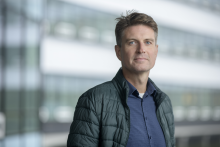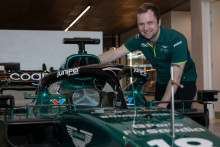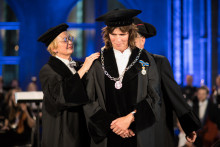You can read this story in Dutch in the UT Nieuws Magazine september.
‘Look,’ says Janneke Hoedemaekers. ‘This is my world.’ She points to the whiteboard in her office located at NanoLab 2.003. There is a group photo hanging on the wall. All men. Right? Those who look closely will discover three women. At 33 years of age, Hoedemaekers is by far the youngest. ‘The big advantage is that everyone knows who I am because of that fact.’
She never gives it a second thought herself, her age and the fact she is a woman. She studied Applied Physicssurrounded by men at the UT and is familiar with the old boys’ network. She holds her own in her role by speaking her mind. ‘I don’t allow anyone to walk over me. If I get the feeling I am being disregarded, I tell them so.’ However, what is perhaps even more important is that she does not adopt the role of the scientist. Above all, she seeks to build frameworks and develop relationships. ‘I do not want to be bogged down by content. The scientists need to deal with that aspect themselves. I do however try to support and facilitate them, for example by directing them to financing opportunities, or facilitating contact with interesting companies.’
Hoedemaekers started at the nanotechnology research institute in 2014. She is Commercial Director Miriam Luizink successor. As Managing Director, she enjoys challenging people. ‘It is wonderful to work with people who are passionate and who have ideas and who go for something. I set the preconditions, but they need to work out the details themselves. I enjoy giving a great deal of freedom and responsibility. Show some initiative and consider your own actions.’

‘You cannot define the transfer of commercial knowledge of fundamental research in linear terms’
In addition to her executive role, Hoedemaekers is engaged in the marketing of research, the transfer of commercial knowledge. ‘Sometimes the processes at MESA+ are very difficult. Scientists often have wild ideas that only appear in an application twenty years later. How do you arrange financing for something like that? In fundamental research, of which we do a great deal, it is not possible to define that in linear terms. For example, if you enter into a partnership with a company, you then work together on a long-term roadmap for ultimately developing technology and bringing it to the market. Our challenge then is to demonstrate that UT research was the progenitor of that technology.’
Social impact
According to Hoedemaekers, not only is the transfer of commercial knowledge economically oriented; it is also about the social impact. ‘You must take responsibility for including various stakeholders in the opportunities and issues related to nanotechnology. In addition, there are the people that you as a university educate and who end up in very diverse parts of the labour market.’ And in terms of entrepreneurship, it is equally about creating and facilitating frameworks. ‘How do we encourage students, researchers, PhDs, or professors to establish companies? How do we help them with the development of a prototype?’
A good example, according to Hoedemaekers, is Lipocoat, UT alumnus Jasper de Weerd’s company that developed a patented coating of just 5 nanometres (5 millionths of a millimetre) to protect medical devices such as contact lenses and catheters against soiling. ‘Our entrepreneurial mindset enables us to ensure a company like that gets off the ground. We look at financing options. Can he apply for a grant if he does not hold an appointment? What do we do about accommodation? We provide input.’
For her part, she would like to see young researchers providing serious input too. She seeks to offer them all the flexibility they need in that respect, ‘so that their voices are genuinely heard. As it happens, there is a new, young generation of scientists. Give them a budget so that they can develop themselves, give them responsibility and make them a part of consultations, like the discussion about the new model for managing research. I think we are moving towards simplification and I’m pushing for us all to engage to help shape that process.’
According to Hoedemaekers, the role the Managing Director fulfils is and remains of great importance for the research of MESA+. Together with Guus Rijnders and Jeroen Cornelissen, both interim Scientific Directors, she is part of the MESA+ management team, whose remit also includes responsibility for the NanoLab. ‘It will remain that way for the time being, until there is greater clarity about the new structure.’ In addition, she is the Directorof High Tech Factory and Fund.

Thinking big
MESA+ still provides plenty of challenges. ‘I like thinking big. MESA+ occupies a good position in the Netherlands. Sometimes we do not exploit that enough externally. That is what I want to focus on. Not just in respect of companies, but also lobbying campaigns and large projects with other knowledge institutes, so that we continue to attract the best researchers.’
Hoedemaekers loves it when the pieces of the puzzle fall into place. ‘That is what I enjoy most, bringing the elements together. Evidently, I have a good network for doing that. I love succeeding.’ Her ability to get things done and to network was apparent from an early age. ‘My mother says I was a curious and cheeky girl who always wanted to know how everything worked, whether in relation to things or people; I wanted to understand.’
At that time, she wanted nothing more than to be a singer. ‘At the age of two, I sang just as much as I talked.’ However, there was no children’s choir in Venlo where she was born and bred. ‘My mother took the initiative to establish a children’s choir together with the music school. And yes, I had to audition.’ However, a fully-fledged singing career was not meant to be. Instead, she opted for a Bachelor’s programme in Applied Physics at the UT. She started in 2002 and finished in 2010.
Student activism
‘Yes, it took a little while,’ laughs Hoedemaekers. ‘I threw myself wholeheartedly into student activism.’ She was active in the Arago students association, played volleyball for Harambee and still does so. She organised a study trip, served as a student member of the educational review committee, was involved in Science on Tour and sang in the TN band. She lived on campus for the first three years at 75 Matenweg, known for its parties. ‘I was involved in the management of Sensation Pink Edition.’ The parties and festivals still prove to be an attraction. ‘Certainly! ‘Into the great wild open’ on Vlieland is a fixture every year.’
Her involvement in student activism helped her develop a huge network, ‘but at a certain point, you break ranks. In 2010, I still had to do one more subject to obtain my Bachelor. Meanwhile, I graduated for my Master’s degree in Philosophy of Science, Technology and Society at the Rathenau Institute.’ She opted for PSTS because she wanted more than just the technology element. ‘I am a generalist and enjoy the social aspect of technology. I saw myself doing more than just conducting research.’
San Francisco
As she had done during her studies, she seized all the opportunities that appealed to her after graduating. That took her to San Francisco, amongst others, where she conducted a scoping study on cooperation in the field of nanotechnology for the Dutch Consulate. ‘It sounded so awesome. I simply had to do it.’ She liaised with the University of California Berkeley, with UC-LA and Stanford University. She was energised by the entrepreneurial spirit in Silicon Valley and that is where she met her partner with whom she now lives in Amsterdam.
Back in the Netherlands, she took up a role with Agentschap-NL (now the RVO). ‘I worked for what is now known as Horizon2020 and advised Dutch researchers and businesses on submitting project applications for European subsidies, how they could get issues onto the agenda and which funding instruments could facilitate partnership.’ After a short stint for the Amsterdam Economic Board, she was headhunted for the position of Managing Director by Dave Blank, former Scientific Director of MESA+. ‘There’s no way I can do that, was my first reaction, but I could see myself doing it in future. It just made sense somehow.’ Laughing, she continues: ‘In five years’ time, but not now, I thought. I was thirty.’ What swayed her in the end was the confidence that Dave gave her on one hand. ‘As well as the confidence Guus Rijnders and Albert van den Berg had in her. And the fact Miriam preceded me; she also started young.’
Once she obtained her diploma, she had actually already bid Enschede farewell. ‘I never imagined I would return.’ But I enjoy it, although it was a bit of a shock that Dave Blank found a new role. ‘I had not expected that. Naturally, he was the driving force. He left a year after my appointment and suddenly I was the one with the most experience of running the institute.’ She elucidates: ‘Then again, not really, because I also have many colleagues who have been working here for years. I am incredibly happy with Guus and Jeroen. We work as a small team and that is enjoyable. It is a different dynamic to working as a pair. I sometimes liken my job to a choir. You are busy producing a piece together, but each has his own voice. It is very important to listen to one another effectively. Sometimes, someone performs a solo. You then give them the space to do that, but otherwise, it is a very beautiful close harmony choir. You can hear everyone’s different tones, but you are singing the same song together.’







